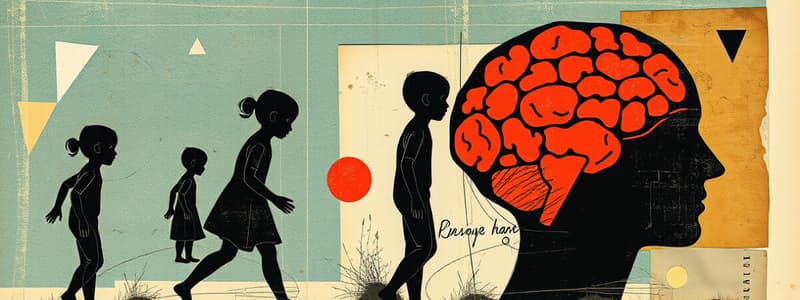Podcast
Questions and Answers
What is the difference between growth and development?
What is the difference between growth and development?
Functional skills and physical appearance changing throughout one's life.
What does physical refer to in the context of life stages?
What does physical refer to in the context of life stages?
Body growth.
What does mental refer to in terms of life stages?
What does mental refer to in terms of life stages?
Intellectual development.
What does emotional refer to?
What does emotional refer to?
What does social refer to in life stages?
What does social refer to in life stages?
What is assimilation in developmental terms?
What is assimilation in developmental terms?
What is accommodation in the context of learning?
What is accommodation in the context of learning?
What does equilibrium refer to in developmental psychology?
What does equilibrium refer to in developmental psychology?
What is a startle response?
What is a startle response?
What is a rooting response?
What is a rooting response?
What does sucking refer to in infant behavior?
What does sucking refer to in infant behavior?
What is the grasping response?
What is the grasping response?
At what age do infants typically roll from side to back?
At what age do infants typically roll from side to back?
At what age can infants typically sit unsupported?
At what age can infants typically sit unsupported?
At what age do infants generally walk without assistance?
At what age do infants generally walk without assistance?
At what age do infants understand some words and make basic sounds?
At what age do infants understand some words and make basic sounds?
At what age do infants typically show emotions like distress, delight, and fear?
At what age do infants typically show emotions like distress, delight, and fear?
At what age do infants commonly become shy and withdraw from strangers?
At what age do infants commonly become shy and withdraw from strangers?
At what age do infants start to mimic and imitate gestures and facial expressions?
At what age do infants start to mimic and imitate gestures and facial expressions?
At what age do children typically learn bladder and bowel control?
At what age do children typically learn bladder and bowel control?
At what age do children start making decisions based on logic?
At what age do children start making decisions based on logic?
At what age do children make decisions based on past and present experiences?
At what age do children make decisions based on past and present experiences?
At what age do children display frequent temper tantrums?
At what age do children display frequent temper tantrums?
At what age do children show less anxiety when faced with new experiences?
At what age do children show less anxiety when faced with new experiences?
At what age do friends of their own age start to become important to children?
At what age do friends of their own age start to become important to children?
Why is it important to encourage parents to bring a familiar object?
Why is it important to encourage parents to bring a familiar object?
What are some late childhood abstract concepts?
What are some late childhood abstract concepts?
What is puberty?
What is puberty?
What causes conflicts during the emotional development of adolescence?
What causes conflicts during the emotional development of adolescence?
What is anorexia?
What is anorexia?
What is bulimia?
What is bulimia?
What does Bulimarexia refer to?
What does Bulimarexia refer to?
What are some reasons people become involved in chemical abuse?
What are some reasons people become involved in chemical abuse?
What decisions are commonly made during early adulthood?
What decisions are commonly made during early adulthood?
What are some factors contributing to satisfaction in middle adulthood?
What are some factors contributing to satisfaction in middle adulthood?
What are some common stressors in middle adulthood?
What are some common stressors in middle adulthood?
What are some physical changes during late adulthood?
What are some physical changes during late adulthood?
Do all individuals show physical changes when changing in their 60s and 70s?
Do all individuals show physical changes when changing in their 60s and 70s?
What are some late adulthood emotional adjustment events?
What are some late adulthood emotional adjustment events?
Flashcards are hidden until you start studying
Study Notes
Life Stages and Development
- Growth and development refer to changes in functional skills and physical appearance throughout life.
- Four key aspects of development: physical (body growth), mental (intellectual development), emotional (feelings), and social (interactions and relationships).
Cognitive Concepts
- Assimilation involves the mind taking in information from the environment.
- Accommodation is the adjustment of thoughts when presented with new information.
- Equilibrium represents a balance between individual understanding and environmental demands.
Infant Reflexes and Milestones
- Startle reflex: a response to loud noises or sudden movements.
- Rooting reflex: babies turn their head in response to a slight cheek touch.
- Sucking reflex: occurs when the lips are touched.
- Grasp reflex: gripping when an object is placed in the hand.
Major Developmental Milestones
- Rolling from side to back occurs between 2-4 months.
- Independent sitting is achieved between 6-8 months.
- Walking without assistance typically starts around 12 months.
- By 6 months, infants can understand some words and produce basic sounds.
- Emotional expressions like distress, delight, and fear appear around 4-6 months.
- Babies may exhibit shyness with strangers starting at 6 months.
- By 12 months, infants can mimic gestures and expressions.
Early Childhood Development
- Bladder and bowel control generally develops by 2-4 years.
- Logical decision-making abilities surface around age 4.
- Experiences shape decision-making by age 6.
- Temper tantrums are frequent among 2-year-olds.
- By age 6, children exhibit less anxiety in new situations and value friendships.
Importance of Familiar Objects
- Encouraging parents to bring a familiar object promotes comfort, safety, and cooperation in children.
Late Childhood and Adolescence
- Late childhood concepts involve understanding loyalty, honesty, values, and morals.
- Puberty includes the development of sexual organs.
- Conflicts in adolescence often arise from issues of identity, insecurity, and independence.
Eating Disorders
- Anorexia is characterized by a lack or loss of appetite.
- Bulimia involves excessive eating or refusal to eat.
- Bulimarexia refers to using laxatives or inducing vomiting after eating.
Factors in Chemical Abuse
- Common reasons for chemical abuse include seeking stress relief and peer pressure.
Early Adulthood Decisions
- Significant decisions in early adulthood involve independence, career choice, lifestyle, and partnership values.
Middle Adulthood Challenges
- Satisfaction in middle adulthood can stem from job stability, financial success, and completion of child-rearing responsibilities.
- Stressors during this stage may include health issues, marital problems, and ongoing children's problems.
Physical Changes in Late Adulthood
- Eight common physical changes include dry skin, thinning hair, changes in posture due to cartilage loss, muscle loss, bladder and heart inefficiency, and decline in nervous system function with lighter hair.
- Not all individuals show physical changes in their 60s and 70s, often influenced by health and living conditions.
Late Adulthood Emotional Adjustments
- Significant life events, such as retirement, death of a spouse, physical disabilities, and financial difficulties, may require emotional adjustments in late adulthood.
Studying That Suits You
Use AI to generate personalized quizzes and flashcards to suit your learning preferences.



